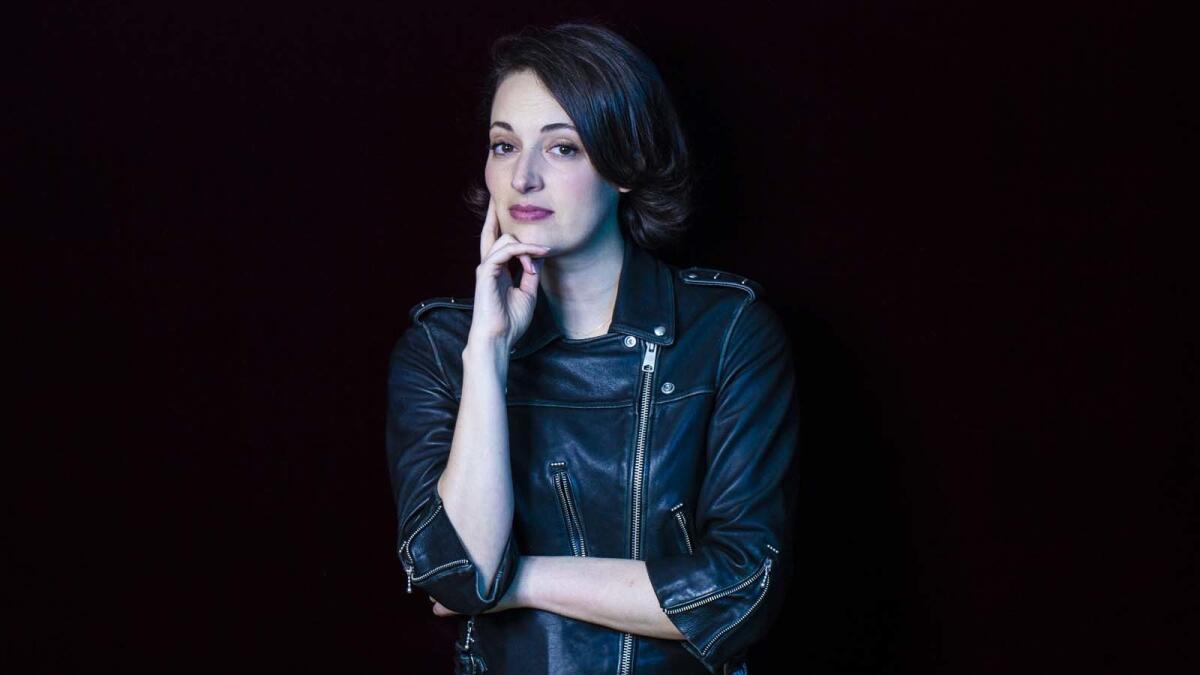Phoebe Waller-Bridge promises that Fleabag’s broken heart is going to mend

- Share via
She’s never named aloud, but the protagonist of “Fleabag” is, indeed, called “Fleabag.”
“It was my family nickname as far back as I can remember,” says creator and star Phoebe Waller-Bridge. So one day, when the show was still a not-yet-finished, one-hour play, it had no title as a key deadline approached. “Then my mum phoned me: ‘Fleabag, darling, how are you?’” She conveys a dreadful but undeniable realization: “‘Oh, no; there’s the title.’”
For the record:
11:31 a.m. Aug. 22, 2019The name of “Fleabag” Season 2 director is Harry Bradbeer. It was incorrectly spelled Bradbury.
“Phoebe” corrupted into “Fleabag.” Those of us who’ve done worse with our own kids’ names can suddenly relate — just as those of us who’ll quietly admit we’ve behaved deplorably can relate to Fleabag. She has no impulse control, she loves deeply, she’s the smartest person in most rooms, her rampant sexuality is a kind of shield. And she makes us complicit with her constant breaking of the fourth wall.
“It was definitely the façade came first,” Waller-Bridge says of the character’s construction. It was originally a 10-minute monologue for what she calls a “stand-up-storytelling night,” so she aimed to wit her audience into submission. “But there was an element of darkness to everything [the character] was saying. She’d sexualize absolutely everything, from food to her own family. If somebody is so relentlessly funny, they don’t give themselves room to be anything else. So I wondered what was lurking beneath.
“The very end of the first-ever 10 minutes was her going to her dad’s doorstep and listing all the things she thought she was: a ‘greedy, perverted, apathetic, cynical, morally bankrupt woman who can’t even call herself a feminist.’ Then I was like, ‘Oh. We have a character on our hands now.’”
Radiantly beautiful, with effortlessly expressive eyes and curated laughs for every occasion — that is the Emmy-nominated creator of both “Fleabag” and the in-your-face, psychosexual roller-coaster thriller that is “Killing Eve.” She also just finished polishing the dialogue of the next James Bond movie at the request of Daniel Craig, and shamelessly stole “Solo: A Star Wars Story” as droid L3-37. She swears Season 2 of “Fleabag” is its last, though she hasn’t had to bid her creation goodbye yet: She’s performing the stage version in London after a New York run. It’ll be broadcast internationally Sept. 12.
“I think it had been six years since I’d last performed her [onstage] and,” she says, chuckling slyly, “I got into rehearsals and I was really, like, shocked in a prudish way! ‘I can’t say this … in front of people!’”
She hadn’t initially thought to continue past the first TV season, which was analogous to the shape of the play. Fleabag’s relationship with the audience in whom she would regularly confide had permanently changed. In Season 1 she had entertained us to distract from awful truths. Her secrets now out, how could she justify continuing that relationship?
“It was actually Harry Bradbeer, our director, [who] asked me one of the most pertinent questions: ‘Is there anything left for her to learn?’
She guffaws with emphatic volume: “‘Yeah, she still has a lot to learn!’ And the biggest lesson is learning to be vulnerable again and have hope and love again.”
Season 2 goes where perhaps no Fleabag has gone before: a love story. But her heart is “locked in a glass jar,” says Waller-Bridge. And his heart is God’s: He’s a priest. And when she breaks the fourth wall, he sees her doing it.
“He sees her,” says Waller-Bridge. “It’s that feeling when you’re seen by someone and it’s frightening. They know too much; they got too close. You want to run toward and away from it at equal speeds. He sees our girl in a way we thought only we could see her.
“But also, I loved the idea of an audience suddenly being aware of their relationship with Fleabag and how private it was. The idea was for the audience to feel a bit exposed. ‘You can see us? Oh my God!’ ”
It’s also about them understanding each other right to the end.
“So much of it is unsaid,” she says. “At the very end, she can tell that he’s going to choose the church over her. She can tell just from him smiling at her.”
Pause, then a slightly embarrassed giggle: “It makes me sad even to talk about it.”
That destination may be solitary, but getting there was worth it.
“She has so much self-loathing at the beginning of Season 1, and by the end of Season 2 she’s smiling at us and waving and saying, ‘I’m gonna be OK.’ I think that’s really the biggest journey. The finale with the priest is so epic for her, it’s so Greek ... I kept saying to myself the whole time, ‘Go Greek or go home.’
“You think that’s the biggest breakup of the show, but really there’s one more to go, which is between her and us.”
So Fleabag’s final look to us is indeed “Goodbye,” as in, “I’m going to be OK; this hurts, but I don’t need you anymore.”
“Yeah, exactly,” says Waller-Bridge, “but with a ‘Thank you’ and ‘I love you.’ ”
More to Read
Sign up for The Envelope
Get exclusive awards season news, in-depth interviews and columnist Glenn Whipp’s must-read analysis straight to your inbox.
You may occasionally receive promotional content from the Los Angeles Times.







